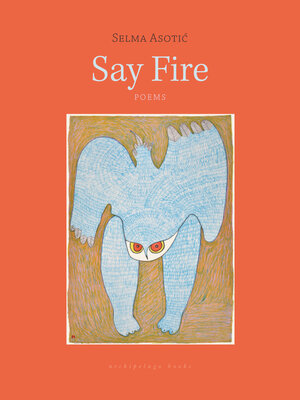
Sign up to save your library
With an OverDrive account, you can save your favorite libraries for at-a-glance information about availability. Find out more about OverDrive accounts.
Find this title in Libby, the library reading app by OverDrive.



Search for a digital library with this title
Title found at these libraries:
| Library Name | Distance |
|---|---|
| Loading... |
Bosnian poet Selma Asotić’s fearless debut on memory and resistance
Wounded bodies are at the heart of Say Fire. Bodies cringe and crouch (years after the war) as fireworks shoot through the sky, bodies fail from cancer in peacetime, bodies collapse into local headlines and reports. The body remembers but seems to learn nothing, Selma Asotić says, her own body mummified by shadowed histories and doubt. With precise lyrical grace, Asotić winds us past these fragments, these questions, into rooms where lovers lie “gorged on light,” their bodies alive and blossoming. A hand on the small of the back might dissolve all rage – all fear – conviction that one has survived.
Born in war-torn Bosnia and Herzegovina, Asotić writes in a feverish present tense, tracing her family history in close lyric and careful reportage. “That’s how/ every history begins./ Something bursts, and everyone clutches their chests to see/ if it is they who burst.” Leaning into her own recursions, hesitations, and doubt, Asotić alchemizes language into something corporeal. With lines that conjure the chimeric turns of Alejandra Pizarnik, Lucie Brock-Broido, and Marina Tsvetaeva, Asotić illumines a life lived in the wake of war – the bodies that touch and leave us, like waves retracting their gestures.
Wounded bodies are at the heart of Say Fire. Bodies cringe and crouch (years after the war) as fireworks shoot through the sky, bodies fail from cancer in peacetime, bodies collapse into local headlines and reports. The body remembers but seems to learn nothing, Selma Asotić says, her own body mummified by shadowed histories and doubt. With precise lyrical grace, Asotić winds us past these fragments, these questions, into rooms where lovers lie “gorged on light,” their bodies alive and blossoming. A hand on the small of the back might dissolve all rage – all fear – conviction that one has survived.
Born in war-torn Bosnia and Herzegovina, Asotić writes in a feverish present tense, tracing her family history in close lyric and careful reportage. “That’s how/ every history begins./ Something bursts, and everyone clutches their chests to see/ if it is they who burst.” Leaning into her own recursions, hesitations, and doubt, Asotić alchemizes language into something corporeal. With lines that conjure the chimeric turns of Alejandra Pizarnik, Lucie Brock-Broido, and Marina Tsvetaeva, Asotić illumines a life lived in the wake of war – the bodies that touch and leave us, like waves retracting their gestures.







